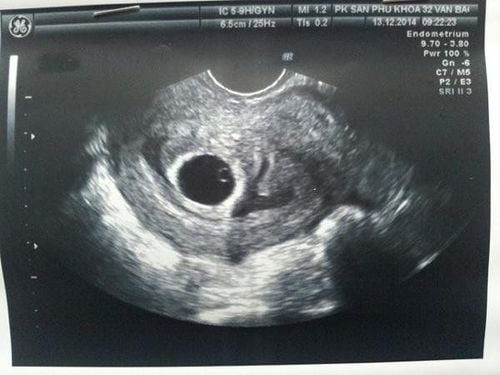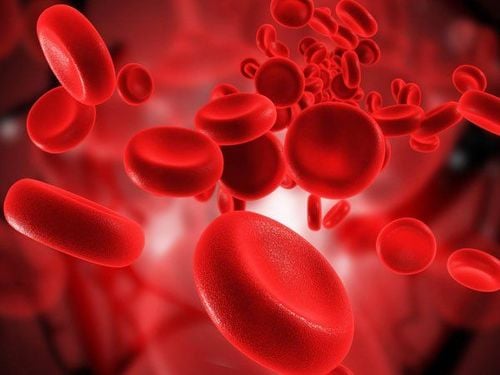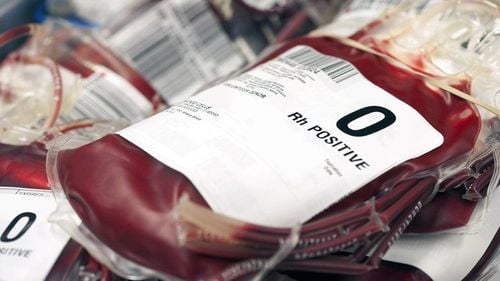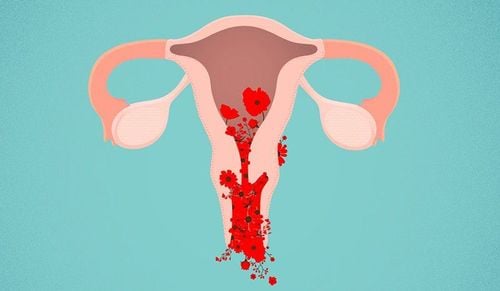This is an automatically translated article.
The article was written by a doctor of Hematology - Blood Transfusion - Laboratory Department - Vinmec Ha Long International General Hospital.
The Rh blood group system is one of the two most important blood group systems involved in blood transfusion. Rh blood group includes Rh(+) and Rh(-) in which Rh(+) is the majority.
1. What is Rh blood group?
This is the second most important blood group system after the ABO blood group system involved in blood transfusion. The Rh blood group is independent of the ABO blood group.
Discovered in 1940 by Lansteiner et al. (Alex Wiener, Philip Levine and R. E. Stetson ). Most Rh antigens (denoted by the letters C, D, E, c, d, e) are weak antigens, except for the D antigen. A person with the D antigen on red blood cells is said to be Rh positive. (Rh+), a person who does not have the D antigen on red blood cells is said to be Rh negative (Rh-). Antibody D (anti D) is normally absent in the plasma of both Rh(+) and Rh(-).
People with Rh D (-) blood group can give blood to someone with Rh D (+) blood group, but can only receive blood from people with the same Rh D (-) blood group.
When Rh(+) blood is transfused to an Rh(-) person, the Rh(-) person will produce antibodies against the D antigen, this antibody formation occurs slowly and usually only reaches the maximum concentration after 2 -4 months. If these Rh (-) people continue to receive Rh (+) blood next time, the anti-D antibodies available in their body will cause red blood cell agglutination, a life-threatening risk to the patient.
According to the regulations of the International Association of Blood Transfusion, blood group with rate < 0.1% in the community is called rare blood group.
Humans are mostly Rh positive, white people have 85% Rh(+) and 15% Rh(-).
In Vietnam, the rate of people with Rh(+) is 99.92%, Rh(-) is 0.08% (according to the data of the Central Institute of Hematology and Blood Transfusion 1996), so the complications caused by not Rh incompatibility is very rare.
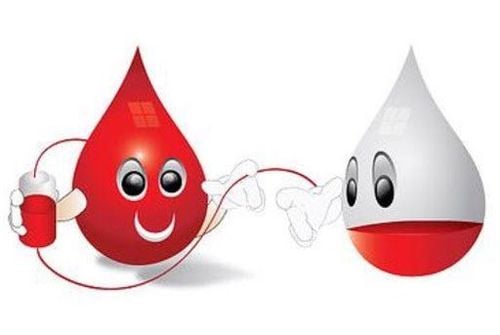
Truyền máu cần đảm bảo yếu tố Rh (-) và Rh (+) theo đúng quy trình
2. How is the Rh blood group test used?
Test to know your blood type, in case you need it.
Test when the patient needs a blood transfusion to select the right unit of blood for transfusion. Testing for people who want to register to donate blood, organs, tissues and bone marrow to determine and assess compatibility of donors and recipients. In addition, for pregnant women, the test also has the purpose of controlling possible risks due to blood group incompatibility between mother and baby.
3. When is Rh blood type tested?
It is very important for the patient to know the correct blood type when a blood transfusion is needed. If blood is transfused to a patient with a blood type that is not compatible with the blood type received by the patient, it can cause transfusion complications, if severe, can lead to death. The patient's body may begin to make antibodies that attack the antigens on the blood cells in the blood that is passed to the patient, causing a reaction and rejection of the transplant.
With the current development of Health, before performing a blood transfusion, the patient's blood group will be checked and tested for a compatible reaction with the donor's blood, helping to minimize the risk of transfusion reaction.
For pregnant women, Rh blood group testing is very important. If a woman is Rh(+) and gets married to a Rh(+), the children may have Rh(+) or Rh(-). When pregnant women have Rh(-) test results, there will be 3 possible problems for the pregnancy:
- Pregnant women may have hemolytic disease in the following pregnancy.
- Pregnant women may have postpartum hemorrhage and must find the right Rh(-) blood group for transfusion.
- Babies can be born with hemolysis due to incompatibility of mother and child's blood group (may occur right in the pregnancy).
One of the most valuable reasons to know one's blood type is to help others. Because in life there is no shortage of unexpected unexpected situations, and the blood reserve bank is in short supply of the blood type that the patient needs, then people with the same blood type as the patient can help the patient. timely blood transfusion.
Solutions for people with rare blood type Rh D(-): Take care of your health and encourage family members to get tested to know their exact blood type.
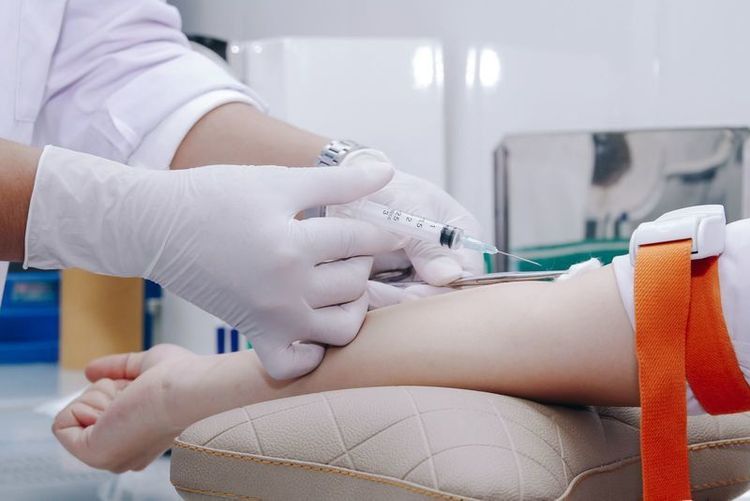
Xét nghiệm máu giúp người bệnh biết được nhóm máu hiện tại của bản thân
4. What do test results mean?
Unlike the ABO system, people with Rh (-) in the blood do not have antibodies, only when Rh (+) red blood cells enter, the body reacts to produce antibodies against the Rh factor. When taking blood from a person with Rh (+) and giving it to a person with Rh (-) for the first time, there was no reaction, but after the transfusion, the body of the person with Rh (-) recognizes the foreign protein, so it produces antibodies against it. Rh factor. When the second Rh (+) blood transfusion causes a reaction, the infused red blood cells are agglutinated, causing a transfusion accident. Subsequent transfusions with Rh(+) cause stronger reactions.
Knowing Rh blood group is also very important for pregnant women. If a woman is Rh(+) and gets married to an Rh(+), the children may be Rh positive or negative. If the mother is Rh (-) pregnant with Rh (+), during pregnancy, during delivery, a small amount of red blood cells of the fetus can cross the placenta into the mother's body. The mother's body will produce antibodies against Rh factor, this antibody from the mother's blood enters the fetus, affects the fetal red blood cells, destroys some of the fetal red blood cells.
The fetus has hemolytic anemia, the fetus will be weakened and may have a miscarriage or premature birth. The next pregnancy, if the fetus has Rh (+), more harm is done. Depending on whether the Rh(+) husband's genotype is homozygous or heterozygous, the miscarriage in the Rh(-) wife is continuous or intermittent.
Pregnant women with Rh (-) blood group need to pay attention to what? Normally, if the pregnant mother has Rh (+) blood group, there will be no problem to worry about. However, if the test result of the pregnant mother has Rh (-) blood group, the doctor will have to conduct a consultation for Rh blood group test for the husband and wife. If the husband has Rh (-) then the doctor will not need to intervene, only monitoring for the pregnancy. If the husband is Rh (+), the woman will have to have an antibody D test, also known as an anti-D test. This test will be done between 20 weeks and 28 weeks of pregnancy. Anti-D test will have results:
If the mother is Rh (-), but when testing for D (+) antibodies, only closely monitor the pregnancy and monitor the baby after birth, especially the baby in the infancy stage. If the mother is Rh (-) anti-D test results are also (-), the pregnant woman must be vaccinated with anti-D Immunoglobulin. Prophylactic anti-D Immunoglobulin will be performed at 3 times of pregnancy at 28 weeks, 34 weeks of pregnancy and 72 hours after birth.
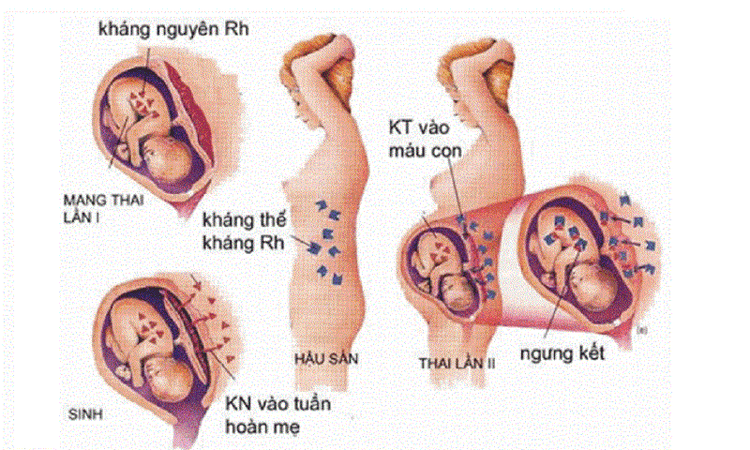
Bất đồng nhóm máu ở mẹ bầu
Inheritance of the Rh factor Simply put, this factor is inherited in a dominant manner, given that the Rh blood group is governed by two alleles R and r. Rh(+) carriers have the genotype RR or Rr. Rh negative carriers have only the genotype rr. In fact, detailed studies of the specific sera of the mother with immunity due to the transfusion revealed that there are different Rh antibodies with different responses to the Rh antigens. Therefore, anti-Rh sera can be divided into anti-C, anti-E and anti-D; Among them, anti-D sera is the most important. Corresponding to antibodies, Rh antigens also include factors C, D, E in which D antigen is the most important, all red blood cells with D antigen are Rh positive.To know you belong to the group blood, you should go to reputable medical facilities for testing. Vinmec International General Hospital is a high-quality medical facility in Vietnam with a team of highly qualified medical professionals, well-trained, domestic and foreign, and experienced. A system of modern and state-of-the-art medical equipment, possessing many of the best machines in the world, helps to detect many difficult and dangerous diseases in a short time, supporting the diagnosis and treatment of doctors effectively. best. The hospital space is designed according to 5-star hotel standards, giving patients comfort, friendliness and peace of mind.
Please dial HOTLINE for more information or register for an appointment HERE. Download MyVinmec app to make appointments faster and to manage your bookings easily.
REFERENCES
Ministry of Health (2013). Circular 26/2013/TT-BYT dated September 16, 2013 “Guiding blood transfusion activities”. Department of Hematology-Blood Transfusion, Hanoi Medical University (2014). Lecture on Hematology-Blood Transfusion (Graduate). Medical Publisher. Website of the National Institute of Hematology and Blood Transfusion: .nihbt.org.vn Website of the Ho Chi Minh City Blood Transfusion and Hematology Hospital: bthh.org.vn Source: - THE HISTORY OF BLOOD TRANSFUSION AND BLOOD TRANSFUSION MEDICINE. bloodbook.com/trans-history.html.
- The History of Blood Banking.




